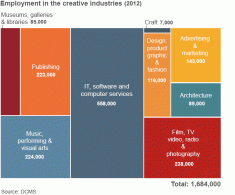January 17, 2014
UK creative industries are growing faster than the economy as a whole, outperforming other industries
by Zeljka Marosevic
Here’s something you don’t hear every day. Official statistics published on Tuesday have revealed that the UK’s creative industries, which include publishing as well as advertising, film, music and galleries, are doing better than any of the other main industry sectors. Not only that, but employment rates in this sector were much higher than in the rest of the UK economy.
The statistics, which were released by the government, show, in particular that the creative industries enjoyed:
- Growth of almost 10% in 2012, outperforming all other sectors of UK industry
- Accounted for 1.68 million jobs in 2012, 5.6 per cent of UK jobs
It’s interesting to see how quickly the sector is growing compared to others, such as the financial services, whose job it supposedly is to make money:
- GVA [gross value added] of the Creative Industries has increased by 15.6 per cent since 2008, compared with an increase of 5.4 per cent for the UK Economy as a whole.
- GVA of the Creative Industries increased by 9.4 per cent between 2011 and 2012, higher than for any of the other main UK industry sectors.
- Employment in the Creative Industries increased by 8.6 per cent between 2011 and 2012 a much higher rate than for the UK Economy as a whole (0.7%).
These findings indicate that despite cuts to government funding, the creative sector has come back fighting, making it worth £71.4 billion per year to the UK economy, and creating more jobs than anyone else. It’s also good to see in the chart below that Publishing (which also includes journalism) employed almost the same amount of people as Music, visual and Performing Arts (and they have One Direction).
Maria Miller, Secretary of State for Culture, Media and Sport, seized on the findings to further her old argument about how Culture=Money:
These incredible statistics are confirmation that the Creative Industries consistently punch well above their weight, outperforming all the other main industry sectors, and are a powerhouse within the UK economy. We are committed to ensuring that the energy, innovation, skills and talent existing in this dynamic sector continues to translate into economic success, and provide a remarkable platform from which, we can showcase Britain to the world.
Notice that Miller wants the sector to keep doing well not because it provides, say, a creative outlet, a means of education, a chance for individual expression, but for “economic success”. And for showing off to other countries so they’re more likely to invest in the UK. For her, money=money=money.
These statistics are pleasing because they show that even in an economic downturn people are continuing to create, whether that’s a film, a building or a book. And it’s paying off for some, that’s clear. However, these sectors require constant reinvestment, whether that’s in ensuring young people are given a chance to start a career, or by providing local services and initiatives that will feed into greater enterprises. Unlike the financial services (remember, they’re the ones that are supposed to be making the money) the creative industries can’t do the same thing again and again to make money. They have to change and adapt, and have the confidence to take risks.
Creative Industries Council Chair, Nicola Mendelsohn, shows a smarter view of the situation when she says:
These figures amply demonstrate the huge contribution our sector makes to the economy and it’s vital that the right framework is in place to nurture and support the industry. We are working with Government on developing a growth strategy for the sector which will identify how all involved can ensure the creative industries continue to go from strength to strength.
Zeljka Marosevic is the managing director of Melville House UK.

